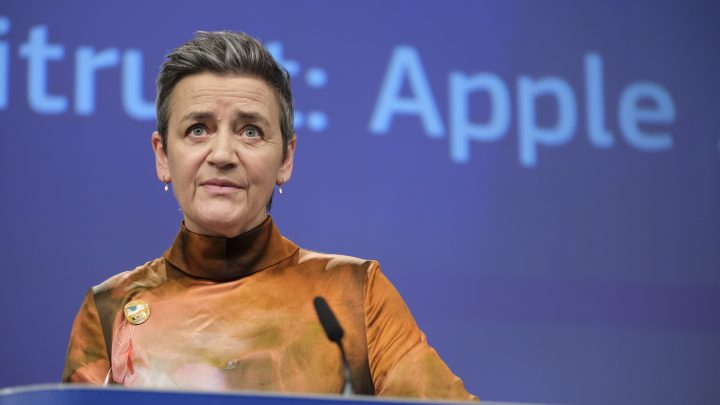
A new EU law aims to tame tech giants. But enforcing it could turn out to be tricky.
A new EU law aims to tame tech giants. But enforcing it could turn out to be tricky.

A major new antitrust law takes effect Thursday in the European Union. And it’s gonna bring some major changes to how the biggest tech companies do business there. It forces Google and Apple to open up their mobile operating systems to downloads and payments outside their app stores. There’ll be no more default browsers like Safari on iPhone or default search engines like Bing on Windows.
Meta has to let users de-link Instagram and Facebook accounts. And messaging apps — we’re talking iMessage, WhatsApp and Signal — have to be interoperable.
EU regulators are already reportedly questioning Apple about its move to block longtime antagonist and Fortnite maker Epic Games from creating a rival app store. But any law is only as strong as its enforcement.
This isn’t the EU’s first big effort to regulate the tech sector. Since 2018, Europe has had comprehensive data protection rules known as the GDPR.
And enforcement has gone so-so, according to analyst Eric Seufert with Mobile Dev Memo.
He says Meta, Amazon and Google have slow-walked compliance, tied up claims in court and often just paid hefty fines rather than change their practices.
“The fines may seem eye popping, but in the context of the revenue of some of the largest tech companies in the world, they’re just seen as sort of a cost of doing business,” he said.
The new Digital Markets Act was crafted with those challenges in mind, says Nicholas Rodelli, head of Legal Edge research at CFRA.
“The animating lesson from a case by case enforcement approach is that it’s far too slow to be relevant,” said Rodelli.
He notes violating the DMA could be more costly than running afoul of GDPR. The new law imposes fines of up to 10% of a company’s global revenues or up to 20% for repeat offenders.
Where the GDPR relied on member countries to bring complaints, the DMA establishes a Europe-wide commission.
“But the real question is going to be, do the enforcers have the resources and commitment necessary to really launch and finish investigations,” said Samir Jain at the Center for Democracy and Technology. He points out the commission will have only about 80 staff members to investigate companies that have a big financial incentive not to cooperate.
Anu Bradford, a law professor at Columbia and author of “Digital Empires: The Global Battle to Regulate Technology,” says there’s a lot at stake in demonstrating the DMA can be enforced.
“We need to now show that you can actually have democratically accountable governments set rules and enforce rules,” said Bradford.
Especially as the EU rolls out two other major reforms — governing social media and AI.
There’s a lot happening in the world. Through it all, Marketplace is here for you.
You rely on Marketplace to break down the world’s events and tell you how it affects you in a fact-based, approachable way. We rely on your financial support to keep making that possible.
Your donation today powers the independent journalism that you rely on. For just $5/month, you can help sustain Marketplace so we can keep reporting on the things that matter to you.

















